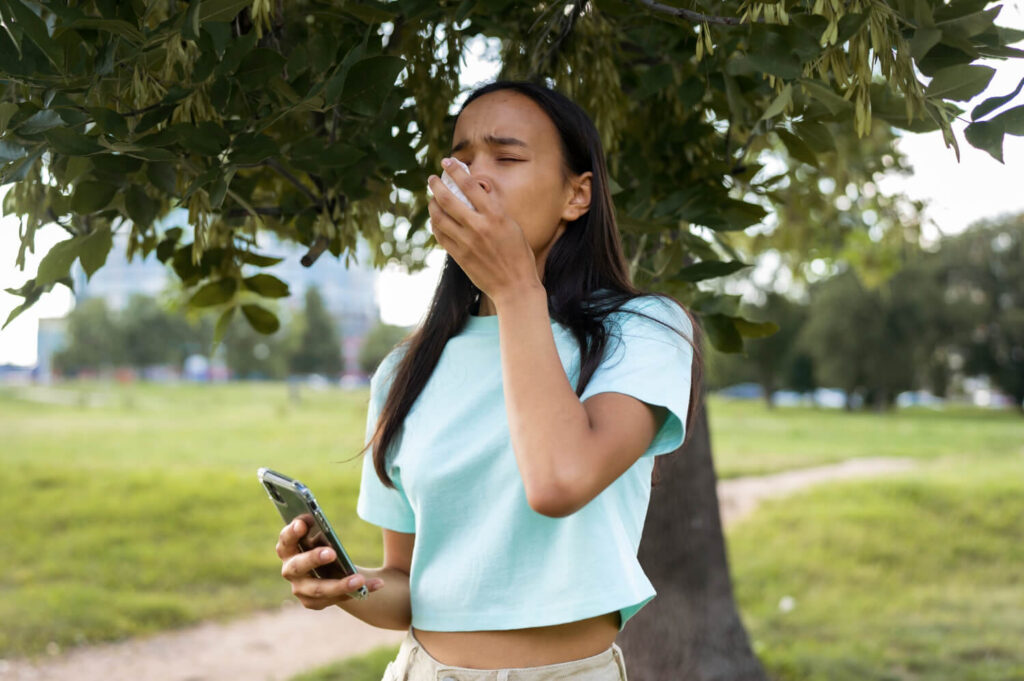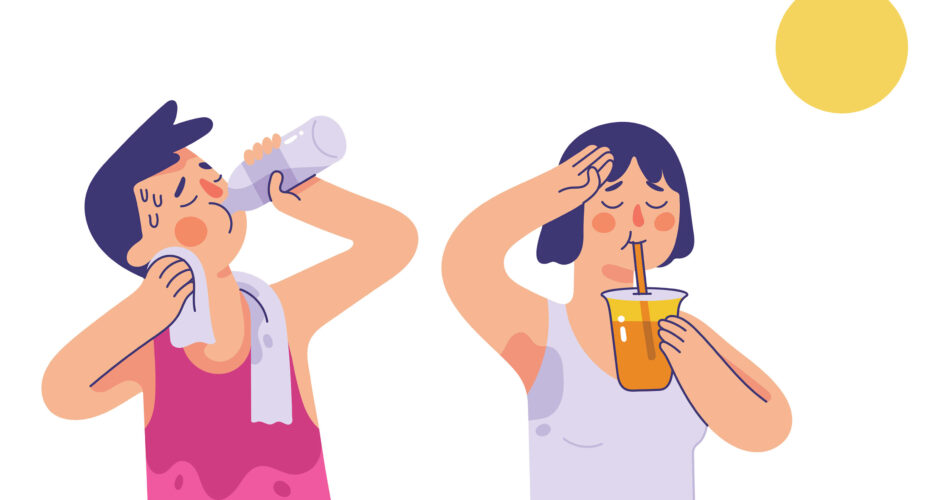The summer season is a time for fun outdoor activities, vacations, and enjoying the warm weather. However, for individuals with asthma, the summer heat can present challenges and trigger asthma symptoms. While summer asthma can be managed effectively with medication and proper care, the weather can still exacerbate symptoms and lead to more asthma attacks.
Understanding how summer weather affects asthma is vital to breathe without worries during this raging heat. Through such knowledge, patients with asthma can take preventive measures and minimize risk of flare-ups. Luckily we can help you through our discussion in this blog. Let’s begin!
Understanding Summer Asthma

Summer asthma or heat-induced asthma involves the worsening of asthma symptoms during this time of year. While some individuals may experience improvement in symptoms during summer due to fewer triggers, others may find their symptoms worsen. The warm weather, high humidity, and exposure to specific allergens and irritants can contribute to the development or exacerbation of asthma symptoms.
These factors are just some of the risks that contribute to asthma triggers. It is important to remember that with proper management and preventive measures, individuals can still enjoy the summer months. By understanding how to manage summer asthma, individuals can minimize the risk of flare-ups and enjoy the summer activities.
The Connection Between Heat and Asthma Attacks
The hot air can have a direct impact on asthma symptoms and increase the risk of asthma attacks. It can cause the airways to become inflamed and constricted, leading to difficulty in breathing. This can result in asthma symptoms such as shortness of breath, wheezing, coughing, and chest tightness.
In addition to the heat, poor air quality during the summer months can also contribute to asthma symptoms. High levels of air pollution, such as ozone and particulate matter, can irritate the airways and trigger asthma attacks.
To minimize the risk of asthma attacks during hot weather, individuals with asthma should take preventive measures such as staying indoors during peak heat times, keeping hydrated to thin mucus in the airways, and avoid the common allergens such as pollen, pet dander, mold spores, etc. By being proactive and managing asthma effectively, individuals can enjoy the summer.
Identifying Common Summer Asthma Triggers
Asthma in summer commonly occurs due to the exposure from extreme heat. Heat exhaustion and even heat stress can elevate the body temperature resulting in constricted airway. Thus, triggering an asthma attack.

While heat is the main trigger for summer asthma, patients should not forget about the common triggers of asthma. As mentioned earlier, there are common allergens that may cause asthma. Here are some of them:
- Pollen (tree pollen, grass pollen, flower pollen, etc.)
- Pet dander
- Dust mites
- Air pollution
Aside from that, there are also cases in the summer that can provoke an asthma attack. For instance, wildfires are common due to dangerously high heat index. Inhalation of wildfire smoke can also result in respiratory reactions like asthma.
That’s why it is important to be aware of the potential threats against lung health during the summer days. Understanding the common triggers and learning how to take steps in minimizing exposure can help individuals to avoid asthma attacks. If a patient experiences flare-ups, it is important to seek a healthcare provider for medical care and to manage the condition.
Importance of Inhalers During Hot Weather
Inhalers play a crucial role in managing asthma symptoms, especially during hot weather. Reliever inhalers, also known as quick-relief inhalers, provide immediate relief from asthma symptoms by relaxing the muscles in the airways and opening them up. They are particularly important during hot weather when asthma symptoms may worsen due to factors like heat and humidity.
Hot weather can trigger asthma symptoms, and having a reliever inhaler on hand can provide quick relief and prevent asthma attacks. It is important to use reliever inhalers as directed by a healthcare provider and to carry them at all times, especially when engaging in outdoor activities.
By using inhalers as prescribed and having them readily available, individuals with asthma can effectively manage their symptoms and prevent asthma flare-ups during hot weather.
Recognizing Symptoms of Summer Asthma
One way to determine if a person is having an asthma attack is through recognizing the asthma symptoms. While the symptoms of summer asthma are similar to asthma symptoms at other times of the year, it is important to be vigilant and proactive in monitoring and managing these symptoms during the summer months.

Common symptoms include:
- Coughing
- Wheezing
- Chest tightness
- Shortness of breath
- Severe symptoms
Recognizing the symptoms of asthma in summer is key to prompt intervention. Symptoms such as coughing, wheezing, chest tightness, and shortness of breath should not be ignored. Seeking medical care for severe symptoms is paramount to effectively
Managing Asthma in Summer

While asthma requires careful management throughout the year, it is important to take extra precautions during summer activities to prevent asthma flare-ups. By following certain guidelines, individuals with asthma can still enjoy outdoor activities and summer fun while minimizing the risk of asthma symptoms.
Safe Practices for Outdoor Exercise
Engaging in outdoor exercise and physical activity is an important part of a healthy lifestyle for individuals with asthma. However, it is important to take certain precautions to minimize the risk of asthma symptoms during hot weather. Here are some safe practices for outdoor exercise:
- Choose the right time: Exercise early in the morning or late in the evening when the temperatures are cooler and the air quality is typically better.
- Warm-up and cool-down: Begin exercise sessions with a gradual warm-up and end with a cool-down period to help prepare the lungs for activity and reduce the risk of asthma symptoms.
- Stay hydrated: Drink plenty of water before, during, and after exercise to stay hydrated and help thin mucus in the airways.
- Know your limits: Listen to your body and know when to take breaks or slow down. Don’t push yourself too hard, especially in hot weather.
Choosing Asthma-Friendly Vacation Destinations
Meanwhile, vacation trips are also important during summer, but precaution should also be in mind, especially with asthmatic patients. Consider choosing asthma-friendly destinations that minimize exposure to common summer allergens and provide a favorable environment for individuals with asthma.
By choosing asthma-friendly vacation destinations, individuals with asthma can enjoy their time away while minimizing the risk of asthma flare-ups and ensuring a more comfortable vacation experience.
Adjusting Asthma Medication in Summer
During the summer months, individuals with asthma may need to adjust their medication regimen to effectively manage their symptoms. Some individuals may require increased use of their reliever inhaler, while others may need additional preventive medications to control their symptoms.
Regular monitoring and communication with a healthcare provider is essential to ensure the medication regimen is optimized for summer weather and triggers.
Developing a Summer-Specific Asthma Action Plan
Developing a summer-specific asthma action plan can help individuals with asthma effectively manage their symptoms during the summer months. A summer-specific asthma action plan should consider the individual’s specific triggers during the summer, such as high pollen counts or poor air quality. It should also take into account weather forecasts and the potential impact of temperature and humidity changes on asthma symptoms.
By having a comprehensive and individualized asthma action plan, individuals with asthma can confidently manage their symptoms and prevent asthma flare-ups during the summer months.
Conclusion
Summer asthma can be challenging, but with the right precautions, you can still enjoy the season. Understanding triggers, recognizing symptoms, and taking preventive measures are key. While summer may be a time to relax and travel to summer destination places, asthma-prone individuals will need assistance.
That’s why it is best to be prepared at all times and that includes monitoring the symptoms, learning possible treatment options, and knowing when to seek emergency help. Remember, it’s vital to prioritize your health and well-being, especially during the warmer months.
When an emergency occurs, seek help from a pulmonologist to address your issue.



